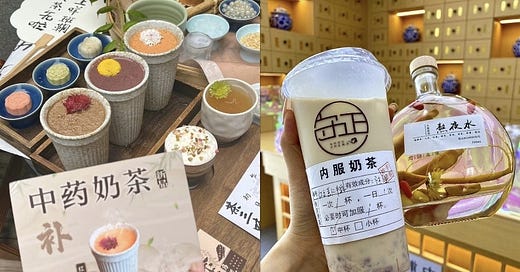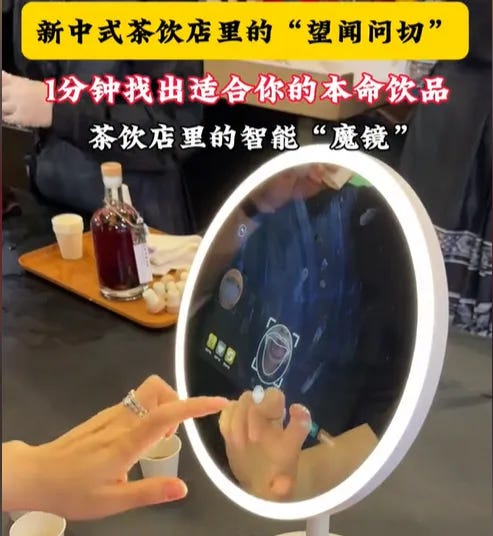How renewed interest in Traditional Chinese Medicine is shaping new consumption trends among young consumers
China's "holistic wellness" economy
The concept of "养生," which roughly translates to "preserving good health" or "holistic wellness," is becoming a major trend among young Chinese consumers. Rooted in traditional Chinese medicine, this approach focuses on health prevention through diet, exercise, and emotional balance, offering a philosophy and practice quite different from Western medicine. One of the core principles of Chinese holistic wellness is prioritizing prevention over treating symptoms when they arise, a concept that has long been embraced by the older generation but hasn’t always appealed to the young.
I still remember my grandmom "forcing" me to drink her terrible-tasting herbal tea in order to make the "Qi" circulate better, the flowing energy that circulates throughout the body but yet cannot be explained by modern science or captured on an Xray or ultrasound; and I remember she disallowed me to drink a refreshingly cool can of soda or turn on ACs during the hottest summer time, because supposedly cold drinks would break the balance of my body even though I didn't feel anything wrong with my body. The idea of prevention didn't appeal to my younger self, as I didn't want to live like an elder.
And I wasn't alone. Many young Chinese, like me, watched their grandparents faithfully follow the practices of Chinese medicine but dismissed it as nonsense, preferring to enjoy a cold soda without worry. But now, in our late 20s, as we increasingly face physical and mental stress, we're finding ourselves drawn back to these ideas.
From doubting, to understanding, to embracing "holistic wellness" —this is the true snapshot of many young Chinese consumers, and this renewed interest in Chinese medicine is creating enormous opportunities for consumer brands.
Incorporating the idea of "health preservation" is becoming a magnet for attracting consumers. To give you an idea of the trend, I'd like to share a portion of a recent report from Jing Daily.
(Translation prepared by
at Baiguan)The rise of the "holistic wellness" economy: why are young people turning to traditional Chinese medicine?
On Chinese social media, the term "fragile youth" has gained traction, describing a younger generation increasingly plagued by poor physical health, "like fragile glass that shatters with the slightest touch." The hashtag related to this topic has garnered over 5.8 million views on Xiaohongshu, a popular lifestyle platform in China. Alongside this, a surge in health and wellness content has spread across Chinese social media. Mounting pressures from work and life, irregular schedules, and the natural aging process are contributing to a worrying trend among young adults: a rise in chronic illnesses and stress-related psychological disorders. For the youth, maintaining good health has become a luxury, fueling the growth of the traditional Chinese medicine (TCM) wellness sector.
According to 鄕伴如初, a TCM clinic based in Guangzhou, its clientele mainly comprises TCM enthusiasts and health-conscious individuals born in the 1970s through the 1990s. A report by Xinhua News Agency, in collaboration with BY-HEALTH and JD Health, highlights that young people are now the primary consumers of health and wellness products, with those aged 18 to 35 accounting for 83.7% of the market.
However, the wellness trend among young people reveals more than just health concerns; it also reflects a broader social sentiment. The obsession with wellness may be an outward expression of psychological compensation, potentially masking a deeper psychological need to escape the pressures of modern life. As China faces an aging population, the burden of healthcare and eldercare on the younger generation is becoming increasingly apparent, especially in light of recent reforms to extend the retirement age. With institutional support still catching up, young people are turning to everyday wellness practices as a proactive measure against these mounting pressures.
The aforementioned report indicates that the average urban resident now spends over RMB 1,000 annually on health and wellness. In today's fast-paced, high-stress society, wellness has become a prevalent lifestyle choice. The "wellness economy" is rapidly emerging as a new consumption trend, gaining traction at an unprecedented pace.
Beyond the well-documented wellness trends of meditation, yoga, and sound therapy covered by Jing Daily, young people are even developing their own wellness practices tailored to their "fragility". Popular methods include homemade herbal tea bags with ingredients like ginger and astragalus, detox juices containing at least eight different ingredients, and even gelato infused with traditional Chinese herbs like red dates and goji berries. Online, wellness-related buzzwords have evolved from "punk wellness" to "cyber wellness," "piecemeal wellness," and "electronic TCM," further fueling the ongoing debate.

According to insights from Mintel, while poor lifestyle habits are severely impacting the health of young people, adopting disciplined and scientifically-backed wellness practices can be challenging. Young people are gravitating towards more relaxed, flexible, and versatile self-care routines, with diet being the most convenient option. Capitalizing on this trend, businesses are launching a variety of products, from sugar-free drinks to low-fat meals, and from supplements packed with trace elements to probiotics for gut health, sparking a booming wellness food market.
In addition to dietary supplements, mental wellness is a crucial aspect of TCM. A media professional residing in Shanghai, Ms. Yu, shared with Jing Daily the details of her wellness expenditures, revealing that she spends over RMB 5,000 monthly on TCM treatments, including moxibustion, acupuncture, Tai Chi, and online courses on TCM theory. "Unlike Western medical consultations, TCM offers a healing atmosphere. The TCM philosophy emphasizes mental tranquility, or 'inner peace', which has taught me how to maintain emotional stability, achieving harmony between mind and body," Ms. Yu explained. "This holistic approach to health also encourages me to address issues at their root, focusing on overall well-being rather than isolated symptoms."
From "body care" to "mind care," modern "new Chinese-style wellness" blends traditional Chinese medicinal culture with contemporary health science concepts, gaining wider acceptance and influence among the younger generation. According to research by youth36kr, in 2023, topics related to "wellness" garnered 2.51 billion views on Xiaohongshu, with over 5.32 million new posts. Users on the platform not only share wellness knowledge but also connect with like-minded individuals who seek spiritual healing through practices like "tree-hugging."
药膳, which literally translates to "food with medicinal effects," doesn’t yet have an English Wikipedia page but has been a core concept in traditional Chinese holistic wellness since ancient times. Similar to dietary therapy, it’s based on the belief that medicine and food share the same origin. The idea is to create delicious dishes using a variety of foods that can treat illnesses or improve sub-health conditions. This approach allows for healing with low-cost, natural ingredients—without the bitterness often associated with traditional Chinese medicine.
Most young consumers may not be seeking true dietary therapy, but incorporating such traditional ideas gives them psychological benefits, helping them feel less "guilty" when enjoying bubble tea or other beverages. In many newly opened tea shops, drinks with less sugar and Chinese herbal ingredients are trending. These beverages are often marketed as remedies for common health issues among young working Chinese, such as counteracting the effects of late nights or aiding in weight loss.

Some tea shop owners are even offering services to examine your tongue coating and recommend personalized tea beverages based on your health. This is a common practice among traditional Chinese physicians who believe that the condition of your tongue coating reflects possible issues with different parts of your body.
China has a deep tea-drinking culture, and while we passionately debate whether Luckin or Starbucks will dominate the beverage market in mainland China, I wouldn’t be surprised if a Chinese medicine store emerges as the dark horse.







